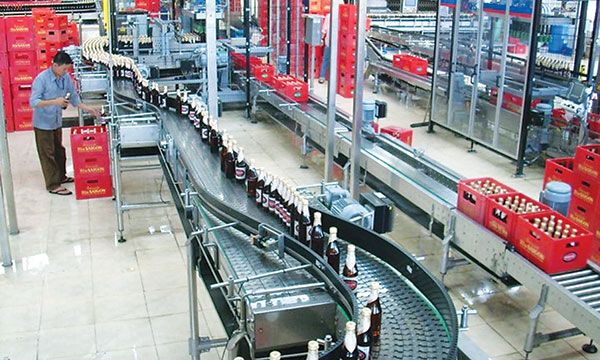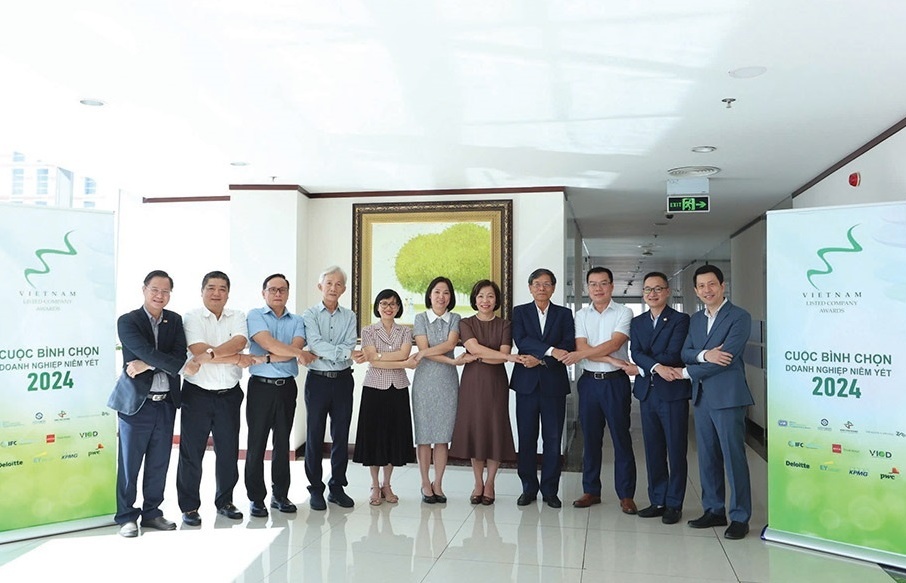Domestic beer makers fear double tax blow

A higher special consumption tax combined with greater foreign imports could see domestic beer firms struggle
Nguyen Van Viet, chairman of the Vietnam Beer-Alcohol-Beverage Association (VBA) told VIR last week that domestic breweries were extremely worried that they would even further lose position if the newly proposed special consumption tax (SCT) is passed into law.
The Ministry of Finance has proposed a revised draft of the law on SCT to the government which increases the rate on some products labeled “luxury” by the government. As well as beer, they include automobiles, yachts, golf courses, and massage services, which will see the SCT rise by 15-30 per cent in mid-2015 as part of efforts to reduce their consumption.
The SCT on beer is set to increase to 65 per cent from the current 50 per cent which will supply an additional VND7.8 trillion ($369.6 million) to the state coffers.
It is expected the draft law will be submitted to the National Assembly during its October meeting this year. The tax hike will take effect on July 1 next year, if approved.
Viet said the increased SCT might make consumers unhappy as currently Vietnamese people prefer domestic beer such as Hanoi, Saigon and Truc Bach because the price is affordable compared to foreign brands, the most popular of which are Heineken and Carlsberg. Two domestic beer companies, namely Habeco and Sabeco, still hold a total two-thirds market share.
“If the SCT rate increases, domestic breweries will certainly feel more negative impact compared with their foreign peers because the latter’s customers are generally higher income earners, while the former supply all walks of life including low and middle income earners. Domestic firms’ sales may fall if their prices after the SCT increase are less affordable,” Viet said.
“Policy makers should take a long-term perspective to the SCT and raise the tax step by step. A skyrocketing increase of 15 per cent could cripple domestic beer firms,” Viet stressed.
Phan Dang Tuat, chairman of Sabeco, said the SCT increase was too high and threatened to lower the company’s earnings. Tuat added that limited capital and management ability also put local firms behind their foreign competitors.
This is not all to say the foreign firms aren’t also looking upon the tax hike with a skeptical eye. Michael Thuan Huynh, marketing manager for Japan’s Sapporo Beer Vietnam, one of the leading foreign brands in the country, said the proposed 65 per cent tax rate greatly worried his company.
Another concern Viet from the VBA expressed is that as the third largest beer consumer in Asia, Vietnam is already a very attractive destination for foreign beer producers and will be even more so after the Trans-Pacific Partnership (TPP) agreement is signed. Viet warned that the upcoming TPP would bring an influx of foreign beer makers into the market as the import tax on beer for members would fall to zero per cent.
“Proposed member countries such as Chile, the US, Japan and Mexico have thriving beer industries that could easily take a leading role in the market,” he said.
Viet explained that currently all domestic beer makers market their products to the sizable low to mid-income population with prices consistent with the needs and budgets of the majority of Vietnamese people. “However, when their standard of living improves, many people would change their drinking habits to foreign brands. Another challenge is that if foreign beer brands are able to reduce their prices, consumers are likely to prefer these brands over their more familiar local ones.”
According to the association’s data, Vietnam’s beer consumption is only behind Japan and China. In the past ten years, it has grown 200 per cent and hit 3 billion litres in 2013, equal to 32 litres a person. The association added that nearly 4.7 billion litres of beer are expected to be produced in 2014 and that this level of growth could and would not be ignored by foreign companies.
Early this month Michel Doukeris, chairman of Anheuser-Busch InBev (AB Inbev), the biggest beer brand in the world with 25 per cent market share, held a meeting with the Ministry of Industry and Trade to announce construction of a $50 million factory in Binh Duong, expected to become operational next year.
As well as manufacturing, Doukeris revealed that AB Inbev would also start importing products into Vietnam in the coming time.
Hirofumi Kishi, general director of Sapporo Vietnam Limited said Vietnam is the most important market in Southeast Asia.
Sapporo Vietnam’s brewery started producing in late 2011 and now its first phase puts out 40 million litres per year with 100 million litres projected for phase 2 next year and 150 million litres in the third phase planned for 2019.
In 1994 Carlsberg acquired 50 per cent of the Hue Brewery Limited (HBL), the market leader in Central Vietnam. HBL became a subsidiary of Carlsberg when the company acquired the remaining 50 per cent in 2011. In another case, Masan bought Phu Yen Beer and Beverage JSC for $27 million.
The latest report from London-based market research and business-intelligence unit Euromonitor International Ltd. showed Vietnam’s beer market had high potential for both foreign and domestic players.
Many foreign players are already investing in the country via mergers and acquisitions. In 2012, SAB Miller, Kirin Brewery Company Ltd., Asia Pacific Breweries and Asahi Breweries Limited expressed interest in acquiring a position in Sabeco.
What the stars mean:
★ Poor ★ ★ Promising ★★★ Good ★★★★ Very good ★★★★★ Exceptional
Latest News
More News
- Exchange and interest rates forecast to remain stable after US election (November 07, 2024 | 14:04)
- Industrial real estate stocks benefit from US election results (November 07, 2024 | 13:56)
- 2024 sees $1.41 billion in fintech funding so far (November 07, 2024 | 08:13)
- Trump at 266 electoral votes, Harris at 195: US media (November 06, 2024 | 14:30)
- Hanoi targets digital and high-tech investment with upcoming event (November 06, 2024 | 13:28)
- Public transport and real estate: The rise of Transit Oriented Development (November 05, 2024 | 15:06)
- Competition focuses on fostering circular economy (November 05, 2024 | 14:00)
- Digitalisation paves way for logistics market to compete (November 04, 2024 | 17:00)
- Green is new buzzword for logistics arena (November 04, 2024 | 15:31)
- Vietnam Economic Pulse Forum discusses sustainable growth (November 01, 2024 | 17:30)
















 Mobile Version
Mobile Version